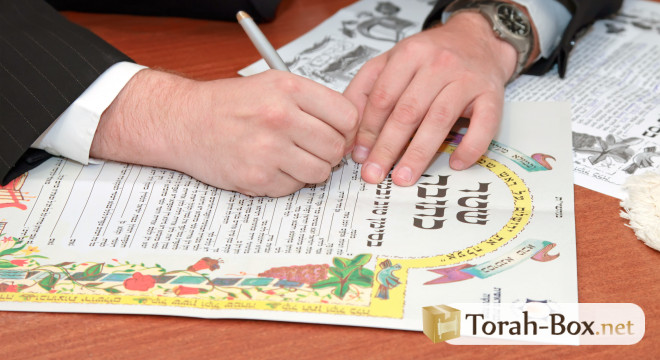
Jewish Thinking
A Ketubah? What is it?
Your wedding day is finally here! You will join your better half, the one Hashem chose for you before you were even born, under the Chuppah. Your Chatan glides the ring on your finger and hands you a Ketubah, the traditional Jewish marriage contract (oh really? Contracts already?). What are the origins of this contract, a document written in Aramaic and going back to thousands of years? What are the clauses it stipulates and why does a man have the obligation to give it to his wife under the Chuppah?
The Origins of the Ketubah
Written in Aramaic, the language of the Talmud, the Ketubah is at the outset, a rabbinic decree instituted by our Scholars to protect women in the event of divorce. Appalled at the way men decided to divorce their wives on a whim, our Sages instituted this law to ensure that when a man marries a woman, he offers her monetary compensation in case of divorce. The custom of reading the Ketubah under the Chuppah was instituted by Rabbeinu Tam, a great sage of the twelfth century and grandchild of Rashi. He stipulated that the reading of the Ketubah marks a separation between the engagement celebration and the nuptials.
The Content
The Ketubah is a unilateral contract describing a husband’s duties and responsibilities towards his wife, which amount to ten. He must feed and clothe her, satisfy her wishes in the area of intimacy, compensate her financially if he divorces her or dies before her, cover her medical expenses should she fall ill and pay a ransom if she is kidnapped. On the other hand, if the wife passes away before her husband, he must commit to cover her burial expenses.
After the husband’s passing, the children must inherit the money pledged in the ketubah, before the remaining assets in his will are distributed amid his inheritors. In the event that the husband dies before his wife, the latter has the right to live in his property or properties up until she dies or remarries. Likewise, his daughters have the right to reside in his property until they marry.
The Ketubah does not obligate a man to “love” his wife. Rather, it gives a man the tools and the necessary ingredients to build a healthy relationship and commit to respect certain obligations as a husband. In her book Circle, Arrow, Spiral: Exploring Gender in Judaism, author Miriam Kosman explains that these binding obligations constitute the setting to allow a couple’s love to grow and flourish.
This document is signed obligatorily by every husband, regardless of his social status. It is in no way an acquisition document, but a document that defines his duties and obligations towards his wife. The Ketubah is accepted by the wife and validated by two witnesses who authenticate the husband’s commitment towards his wife. The marriage will only be valid if two kosher witnesses are present and sign the Ketubah.
A Man’s Duty Toward His Wife
Why doesn’t the Torah include a wife’s obligations towards her husband? In fact, G.d created woman with an innate predisposition to want to get married. According to Jewish law, only males have the obligation to marry and build a family, an obligation that women are exempt of. This is probably because man’s nature is not prone to commit. This is the reason G.d imposes the responsibility upon him.
G.d expects us to overcome our evil inclination, to fulfill our mission in this world Miriam Kosman adds an interesting remark in this regard: since a man is not predisposed to commit to a woman, G.d expects him to do so, as this is precisely what will lead him to grow and flourish.
The Ketubah: A Document to Protect Women
In summary, we may conclude that the Ketubah was conceived to protect women and ensure that their husbands will cherish and satisfy their emotional and material needs. This is the most benign document for women. It enables man to commit and shoulder his responsibilities. May we live to enjoy all the advantages bestowed by G.d upon the Jewish woman, particularly the ingenious elements in the ketubah, and may we utilize the tools He grants us to flourish and succeed in our marriage! Amen!
Torah-Box.net Account
To access the entire Torah-Box.net website, sign up for free in less than a minute.
Weekly Parsha
 Candle Lighting - New York
Candle Lighting - New York
Friday March 6th, 2026 at 17:34 *Shabbat ends at 18:35 *
change my location
* Times given as an indication, check the times of your community











